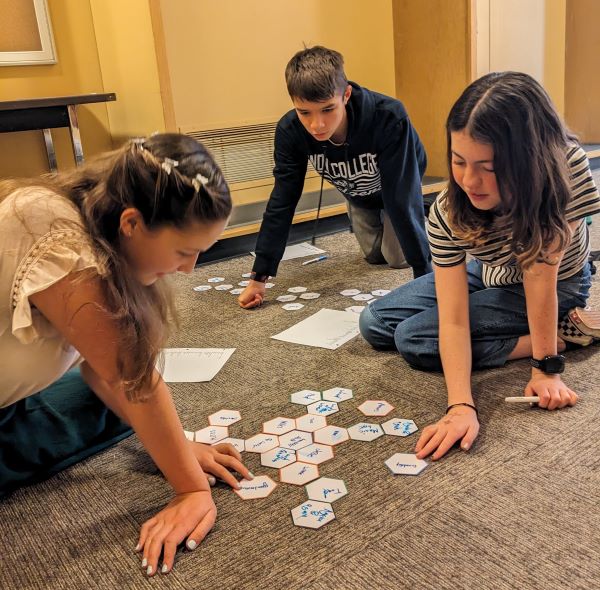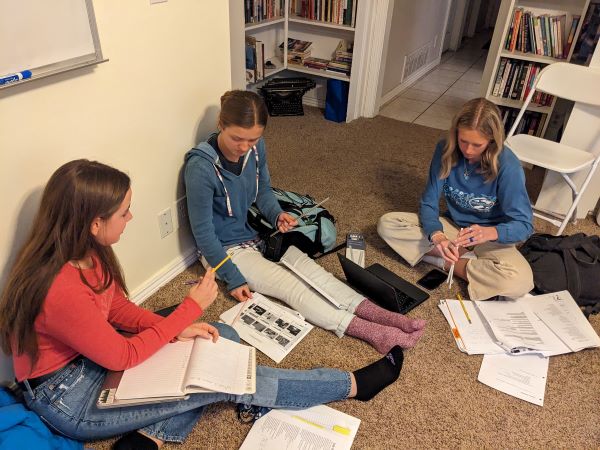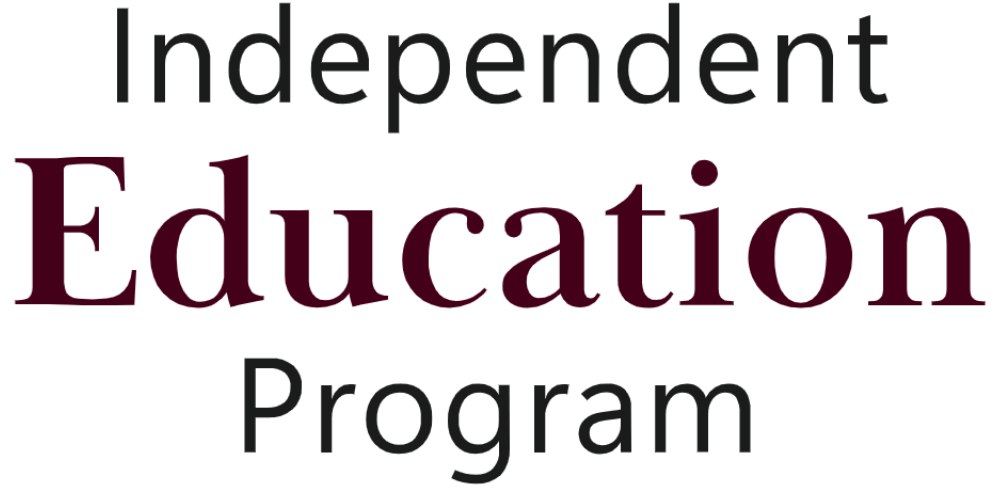English & Writing
We offer a full secondary English program for students, regardless of their current academic level. Our curriculum is dynamic and designed to allow students to participate every year of grades 7-12 without repeating content.
The program includes three levels–Beginning, Intermediate, and Advanced–with two years of rotating content at each level. Both years of each level are complementary but not sequential, meaning your student will have a positive, impactful, skill-building experience, regardless of the order in which they take classes.
Be sure to check out our FAQ section below for specifics related to content questions, homework, supplies needed, etc.
Beginning English
Both years of Beginning English invite the student to see themself as a writer and a reader.
Students read assigned books, learning simple analysis tools so they can discuss themes at an age-appropriate level. Students also choose their own books to read throughout the year, which allows them to continue to develop their understanding of literature at their reading level. Students are continually fed a bevy of new book options and are encouraged to expand their reading horizons with unexplored genres and styles.
Appropriate for ages 12 to 14.

WordPlay (even year start)
Words can be playful and expressive–puns, rhyme, personification, metaphor and so much more.
In this class, students play with words through poetry and creative writing, exploring the nuances of word choice that influence tone, voice, and meaning. Non-fiction writing includes teaching the 5-paragraph essay structure, which is enhanced by the students’ interests and sense of humor. Examples of great writing are used extensively so students can mimic the greats in their own writing. Students also learn the value of revision through gentle, supportive, one-on-one mentoring.
Grammar and mechanics, through mentor texts and organic sentence structure, is also included. Creative literary projects and a Shakespeare unit provides variety throughout the year.
Books are subject to change, but in the past included: Frindle; The Cay; The Giver; The Book of Boy; The True Confessions of Charlotte Doyle
The Wonder of Words (odd year start)
The right word used in just the right way can delight, inspire, intrigue, or invite.
In this class, students find their writer’s voice through assignments such as poetry, personal narrative, and short fiction. Students develop themes in their writing through genre structure, sensory description, dialogue, and strong word choice. Mentor texts are used extensively so students can mimic the greats in their own writing. Students also learn the value of revision through gentle, supportive, one-on-one mentoring.
Fundamental grammar and punctuation, including sentence diagramming, is also included. Creative literary projects and a Greek Mythology unit provides variety throughout the year.
Books are subject to change, but in the past included: Love That Dog; From the Mixed-Up Files of Mrs. Basil E. Frankweiler; Tuck Everlasting; Holes; Secret Garden.
Intermediate English
Both years of Intermediate English teach students how to look beyond the surface of literature to explore an author’s themes and literary style, helping them develop deep critical-thinking skills and greater self-awareness. They are then invited to share their thoughts in lively class discussions and through thoughtful writing assignments.
Appropriate for ages 14 to 16.
Class can be considered an honors level English class.

The Looking Glass (even year start)
Literature can serve as both a window to the world beyond and a mirror to a student’s inner world.
In this class, students look both directions as they learn how authors use genre, point of view, literary forms (like the hero’s journey), and literary devices to transport the reader beyond their current understanding and make connections with their inner self.
Writing assignments include an analysis essay, personal narrative, poetry, and creative fiction. Freewrites, included throughout the year, support students as they learn to put their thoughts in writing. Mentor texts are used to teach elevated sentence structure and language, as well as advanced grammar and punctuation.
Targeted, supportive, one-on-one mentoring is included to help the student incrementally improve their writing.
Books are subject to change, but in the past included: The House on Mango Street; Born a Crime; Red Badge of Courage; The Chosen. One Shakespeare play is also studied, which in the past was Romeo and Juliet.
Short stories, poetry, and non-fiction essays are included.
Undercover (odd year start)
There’s so much more going on in great literature beyond a basic plot.
In this class, students take on the role of detective as they learn to go “undercover” to discover the literary devices authors use to develop themes and enhance the beauty of their work. Students also explore how literary devices are used in modern media.
Writing assignments include analysis essays, personal narrative, and creative fiction. Freewrites, included throughout the year, are encouraged as a tool to brainstorm on paper. Advanced grammar and punctuation is covered through holistic, direct-application assignments.
Targeted, supportive, one-on-one mentoring is included to help the student incrementally improve their writing
Books are subject to change, but in the past included: Animal Farm, To Kill a Mockingbird, A Christmas Carol, Importance of Being Earnest, The Book Thief.
Short stories and poetry are also included.
Advanced English
Both years of Advanced English invite students to explore complex questions, “big” ideas, and universal themes that authors have wrestled with throughout time. Students are also invited, through deep discussions and open-ended writing assignments, to use great works as a vehicle to expand their understanding of the world and themselves.
Appropriate for ages 16 to 18.
Class can be considered an honors or AP level, although it does not specifically prepare students for an AP test.

The Human Experience (even year start)
“What does it mean to be human?”
In this class, students explore this “big” question through universal themes such as loyalty and friendship, pride and power, and the nature of forgiveness. Students discuss each theme using literature, poetry, essays, and modern media, examining each theme through the lens of literary devices, author context, and personal experience. Students are also encouraged to develop their own questions based on their readings to discuss in class.
Writing assignments include several short essays that respond to a theme-related question, as well as poetry, non-fiction review, and a personal narrative (which can easily be used as a college or scholarship essay). In addition to expressing ideas clearly and effectively, writing style and developing voice is emphasized. Encouraging, leveled, one-on-one mentoring supports the revision process.
Books are subject to change and students are given books to choose between during the year, but in the past have included: Frankenstein; Joy Luck Club; A Separate Peace; Of Mice and Men; Great Expectations; Jane Eyre; The Alchemist; A Man Called Ove; Cry, the Beloved Country; Peace Like a River, and one Shakespeare play - Macbeth.
Additionally, students explore themes as a class with poetry, short stories, essays, and modern media, but they choose novels to read from a recommended list based on class themes. This allows them to self-determine the content, length, and difficulty of their reading.
The American Question (odd year start)
“What does it mean to be an American?”
In this class, students explore this “big” question through American themes such as individualism, civil rights, freedom, and the American Dream. Students discuss each theme using American literature, poetry, essays, and modern media, examining each through the lens of literary devices, author context, and personal experience. Students are also encouraged to develop their own questions based on their readings to discuss in class.
Writing assignments include a personal narrative (which can easily be used as a college or scholarship essay), poetry, opinion essay. The class culminates with a curated multi-media exhibit in which the student explores and answers the class question, supporting their ideas with class readings, interviews, modern media, and their own perspective developed throughout the year. Original thought and a student’s unique approach to the question are encouraged. Encouraging, leveled, one-on-one mentoring supports the writing and revision process.
Books are subject to change, but in the past included: The Scarlet Letter, Huckleberry Finn, Raisin in the Sun, The Great Gatsby, and Fahrenheit 451.
Poetry, short stories, speeches, opinion essays, theatrical productions, movies, and current events are also used to explore the class question.
Frequently Asked Questions
English FAQ
What homeschool philosophy is this curriculum built on?
None specifically, although it pulls from what we consider to be the best ideas of several major homeschooling ideologies. This curriculum is focused on helping students build the critical thinking skills and technical skills to help them successfully navigate college or other “post-high school” pursuits. It uses literary classics as its framework (both new and old), and it strives to include a variety of voices (culture, gender, race, etc) in the books selected.
My kid has read most of the books listed. Is it still valuable for them to take the class?
Our curriculum is designed to support students who are reading a book for the first time, as well as avid readers who have read a book before. Because a classic book has new things to discover each time it is read, a student who is going through the book for the second (or third!) time benefits from being able to more easily discover the author’s craft and themes instead of just reading to know how the book ends. Our students regularly comment how they enjoy revisiting a book and that they find additional insight from class discussion about books they’ve already read.
Do you include books with bad language? Graphic content? Immorality?
While it’s never desirable to be exposed to rough language or graphic content, we believe you can’t completely “bubble” the students. One of the reasons we put age limits on our classes is because we want to be able to discuss and wrestle with more difficult and “worldly” ideas, which students are usually exposed to already. Since they can’t be shielded forever from these things, the goal is to provide a forum to discuss difficult concepts in the context of a solid, values-based foundation.
Also, the value of what can be learned from these books is extremely high. These are considered classics not just because of the plot but also the way the author crafts the story – including their use of symbolism, imagery, characterization, diction, tone and other literary techniques. How the author uses these techniques to unfold the themes in the book is one of the valuable processes that the students are learning because the depth of understanding of the theme only comes as it’s discovered through each student’s personal analysis and thinking.
My kid is really sensitive. What if they can’t read a book the class is reading?
We recognize that different students have different sensitivities. Either because of past experience or personal issues, a specific book may be “too much” for a student. If so, we have ways to accommodate them so they can still feel successful in the class.
My kid has learning challenges (ADHD, dyslexia, struggles to read, hates to write). Will these classes work for them?
We believe in the principle of low floor/high ceiling when developing our curriculum. That means that every student who is willing can come to class and feel successful. Homework assignments are designed to meet a variety of learning needs and accommodations can be made to help students, including listening to audio books, having parents help type papers, etc. This curriculum is specifically designed to support “learning-different” kids.
With that being said, class frequently includes reading (to self) and writing by hand. Students in Intermediate and Advanced must be comfortable doing both in order to participate in class.
My kid is gifted (reads a thousand pages a week, writes all the time, etc). Will these classes work for them?
The low floor/high ceiling model we use is designed to accommodate a student who is ready to do more. We build in ways for them to push themselves throughout the curriculum, including additional reading options and bonus homework assignments. In addition, most of the activities and writing assignments are built so that no matter how “gifted” your student is, they will still have room to improve and build upon what they can already do. Also, our individual mentoring process for writing means each student gets feedback that aligns with what they need most to grow.
Which level should my kid take this year?
12 (7th grade): Beginning
13 (8th grade): Beginning
- If this is the first year in the program, we will discuss whether they are ready to move to Intermediate or would benefit from another year in Beginning.
- If students have spent two years in Beginning, they are ready to move to Intermediate.
14 (9th grade): Intermediate
- If your student is comfortable writing their ideas down and is ready for deeper-level discussions, they are a good fit for Intermediate.
- Consider Beginning if your student is still struggling with basic writing (sentence structure/writing a paragraph) and they need a more gentle book list.
- After one year in Intermediate, a few 14-year-old students may be ready to move to Advanced, but most will benefit from another year of Intermediate. Mentor approval is required.
15 (10th grade): Intermediate
- At the end of the year, most students are mature enough to move to Advanced.
16-18 (11th-12th grade): Advanced
- Due to the nature of discussions and level of maturity, almost all students benefit from being 16 before joining this class.
- Individualized writing mentoring supports students who have less experience with writing.
- A 15-year-old student may only take this class with mentor approval.
Can my kid skip a level and move ahead?
Usually students benefit from staying in the age-range that’s outlined for the classes, including spending two years in a level. We have found that even gifted students benefit from being around peers of roughly the same age. Also, while a student may be able to read the content, they aren’t necessarily ready to do the level of critical thinking or have the emotional maturity required in the higher level classes.
If you feel that your child should be an exception, please reach out, and we will review your request.
How much homework and what kind of homework will my kids have?
Because we only meet once a week, the curriculum assigns homework to do anything that can be done at home, reserving class time for experiences that benefit the most from a group setting and in-person mentoring. That means most lecture-style teaching, all reading, and much of the writing will be done at home.
Each level has a different amount of time that students will spend on average. The amount of time a student spends will vary depending on how fast they read and how fast they write.
- Beginning: 1-2 hours per week
- Intermediate: 2-4 hours per week
- Advanced: 4-5 hours per week
All homework is listed each week in our assignment software.
All assignments are turned in digitally through a homework submission form.
What will my kid be able to do after they take these classes?
Our goal is to prepare the kids to be strong critical thinkers, as well as have the practical skills they need to be successful in college, their careers, or other adult pursuits involving language and communication. To accomplish this, we teach skills using age-appropriate activities and assignments that are designed to build on themselves year after year.
Will my kid get individual feedback on their writing assignments?
Yes! The individualized writing feedback provided by the mentor is one of the core elements of our writing program. Each mentor reads and comments on writing assignments that are turned in. They also provide in-class writing time for larger writing assignments, including revisions, so that a student can discuss in-person how to improve their writing with the mentor, as well as how to overcome mental blocks that often surface during the writing process.
What supplies & equipment will my student need in addition to books?
In class (every week):
- Laptop
- Internet access to access Google docs
- Intermediate/Advaced: Browser access for research
- Writing notebook
- Pens/pencils/sticky notes
At home for homework (every week):
- Laptop/Desktop to complete writing assignments
- Internet access
- Assigned YouTube & other recorded instructional videos
- Research for writing assignments
- Google docs & forms
- Writing notebook
- Pens/pencils/sticky notes
NOTE: Each student provides their own copy of assigned books. Book lists are provided well in advance so you have plenty of time to make sure your student has the books they need.
A binder with supplemental readings, grammar assignments, and activities is included with the cost of your tuition.
Who should I talk to if I have questions?
If you have questions about class content, scope and sequence, or anything else related to the curriculum, reach out to ToriAnn Perkey at toriann@ieprogram.org.
If you have questions regarding the level your student should take, class dynamics, or anything else related to a specific teacher, reach out to the teacher for the class day/time you are considering.
